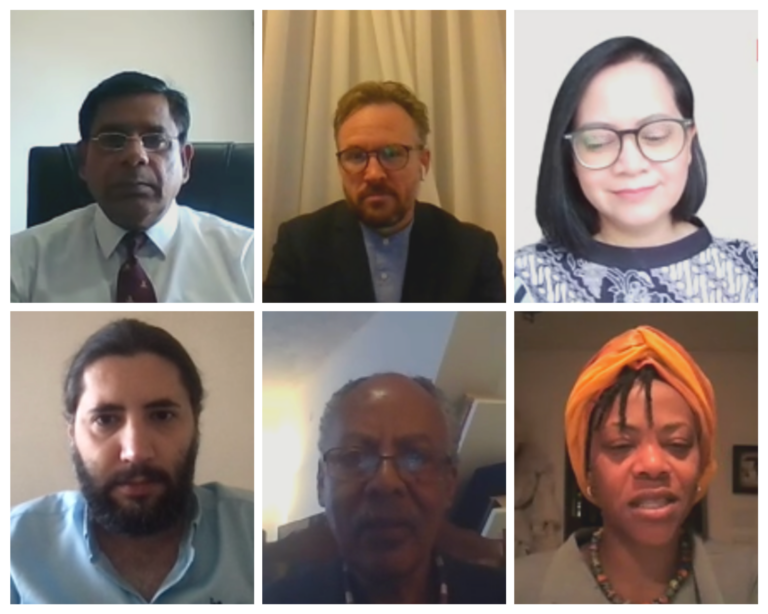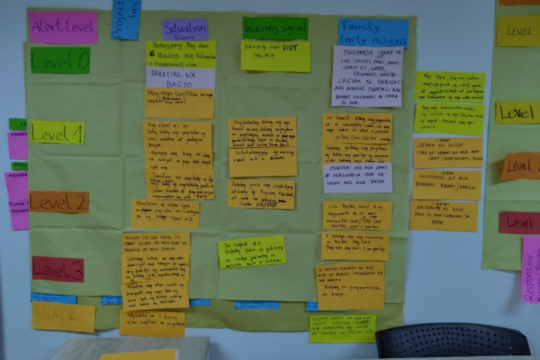The Asian Preparedness Partnership (APP) organized the ‘Leave the No One Behind’ webinar as part of the Asian Disaster Preparedness Center’s (ADPC) Webinar Series on 6 October 2021. The virtual dialogue was a part of the APP Learning Series. It focused on how the pandemic has highlighted the recognition of the crucial role that local actors play in resilience building. It also details the good practices of these actors in disaster risk management (DRM) amongst vulnerable populations and how to foster knowledge-sharing of these practices. There were 301 participants during the virtual event.
The webinar brought together panelists from local and international development organizations, governments, and research institutes from various parts of the world. Staying true to the theme, Ms. Aimee Gabrielle S. Adiwang and Ms. Ember C. Parpa-Palma provided sign language interpretation of the virtual event. The session was moderated by Mr. Edwin Salonga, Program Manager, ADPC. He introduced the session by expressing how the session would draw upon both local and global perspectives on advancing localization and including vulnerable populations in disaster response efforts.

Maj. Gen. S. Ranasinghe (Retd.), Director-General, Disaster Management Center (DMC), Sri Lanka, elaborated on the whole-of-society approach in DRM and the strategies/ policies that led to its successful implementation. He explained the decision to open the country to trade and travel in 2021 and the challenges that came with it, “We witnessed cases in all 25 districts of the country. However, the robustness of the health system was committed to ensuring the optimum health of the public. It was supported by the strong political leadership to make sure that the government and society were responsive to these initiatives.”
Dr. Matthew Scott, Senior Researcher in Human Rights, Disasters, and Displacement, Raoul Wallenberg Institute (RWI) of Human Rights and Humanitarian Law, explained the policy responses to the pandemic from the perspective of human rights and gender equality. He stressed the need for changes in policies while citing some inclusive approaches for Latin America, “Ecuador has addressed the response to information by systematically and consciously targeting indigenous populations by including these communities in the dissemination and design of message. The authorities in Costa Rica have designed targeted response plans for different groups including those with specific vulnerabilities.”
Ms. Sri Kusuma Hartani, Program Director, LeaN On by INVEST-DM, Mercy Corps Indonesia, detailed how LeaN On addressed access to COVID-19 information and services for marginalized communities in selected parts of Indonesia. She illustrated LeaN On’s approach to reaching more communities in light of COVID-19, “We relied heavily on remote and virtual coordination for a weekly meeting while our field workers focused on offline counseling. Our experiences demonstrated one generic model evolve into a personalized one. This change has led our 500 caseworkers who reached more than 160,000 people”

Mr. Iyad Agha, Forum Coordinator, NW Syria NGOs Forum, specified some of the key development initiatives that were locally set up to support affected populations during the pandemic. He reflected on how COVID-19 has highlighted the potential of international non-governmental organizations (NGOs), local NGOs, and United Nations (UN) agencies – “We witnessed pandemic interventions being enacted by the local actors to improve livelihoods. One of the initiatives was to employ the people who had lost their jobs in the pandemic to produce personal protective equipment (PPE).”
Mr. Tadesse Bekele, Senior DRM Advisor, National Disaster Management Center (NDRMC), Government of Ethiopia, illustrated how timely interventions have helped national authorities address multiple-disaster events across the country. He detailed how the government responded to flood events, locust infestations, and political instability, and the pandemic: “We activated emergency coordination centers at the federal and regional levels before COVID spread. Our department stepped in once it had become a national concern. We worked with all lead sectors such as health and education.”
Dr. Valerie Bemo, Deputy Director, Emergency Response, Bill & Melinda Gates Foundation (the foundation), provided a global overview of how the engagement of various actors is impertinent to expediting the localization agenda. She referenced the Grand Bargain at the World Humanitarian Summit 2016 to analyze this requirement – “The bargain committed to providing local and national responders with 25% of global humanitarian funding. Three years later, we found that it was less than 2%. COVID-19 has shown how local actors lead response efforts and it will progress the transformation of the international system.”
Watch the webinar by clicking the link below:


